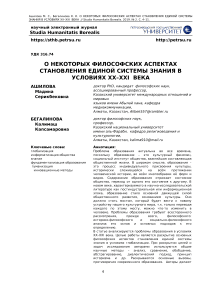On some philosophical aspects of the formation of a unified system of knowledge in the context of the 20th and 21st century
Автор: Ashilova Madina Serikbekovna, Begalinova Kalimash Kapsamarovna
Журнал: Studia Humanitatis Borealis @studhbor
Рубрика: Философия
Статья в выпуске: 2 (13), 2019 года.
Бесплатный доступ
Education problems are relevant at all times, since education - is a cultural phenomenon, a social institution of society, the most important component of social life. In a broad sense, education - is a process of individual appropriation of culture, historically formed throughout the human history, in a variety of its forms and shapes. The content of education reflects the state of society, the transition from one state to another. In the new century, which is characterized in the research literature as a post-industrial or informational age, the education has become a major driving force of social development, and the basis of culture. It should be a bridge that will lead to a new structure of our cultural world, as only by crossing this bridge by everyone, you can change something in a person. Educational problems require comprehensive consideration, above all, philosophical: historical and philosophical and social and philosophical analysis of its principles and the basic approaches to its definition. The article analyzes the problems of education in the conditions of the XX-XXI century. The aim of the work is to reveal the basic philosophical aspects of the formation of a unified system of knowledge in the context of globalization. When re-vealing the goals and objectives of the study, the authors use general scientific methods - analysis, comparison, generalization, abstraction, dialectical approach, the principle of historicism, etc. The main challenges and contradictions of modern education are revealed. The authors conclude that in the context of globalization and informatization of society, the formation of a unified system of knowledge arises as a real and urgent problem of society. Its main feature should be a change in the content, essence, and forms of education. It is emphasized that a flexible synthesis of traditional and innovative in the educational process, a close connection with ethno-pedagogical features is necessary.
Globalization, informatization of society, knowledge, fundamentalization of education, humanization, innovative methods
Короткий адрес: https://sciup.org/147225822
IDR: 147225822 | DOI: 10.15393/j12.art.2019.3401
Список литературы On some philosophical aspects of the formation of a unified system of knowledge in the context of the 20th and 21st century
- Берулава М. Н. Развитие отечественного образования: выбор основного вектора движения // Философия образования. 2006. № 1. С. 15-19.
- Валицкая А. П. Как возможна общая теория образования, или о междисциплинарном статусе понятия "диалог" // Диалог в образовании: Сб. материалов конф. СПб.: Санкт-Петербургское философское общество, 2002. С. 9-16.
- Ежова Т. В. Формирование общекультурной компетентности студентов в образовательном процессе вуза: Дис.. канд. пед. наук: 13.00.01. Оренбург, 2003. 185 c.
- Коменский Я. А. О развитии природных дарований // Коменский Я. А. Избранные педагогические сочинения. М.: Педагогика, 1982. Т. 2. 656 с.
- Нечаев В. О. Параметры глобализма и факторы Болонского процесса // Вестник Московского университета. 2004. № 4. С. 27-34.
- Новая технократическая волна на Западе. М.: Прогресс, 1986. 453 c.
- Ортега-и-Гассет Х. Эстетика. Философия искусства. М.: Искусство, 1991. 588 с.
- Ракитов А. Н. Информатизация: состояние, структура, перспективы // Перспективы информатизации общества. М., 1990. С. 40-65.
- Штерн Н. Мир из знания // Социологический журнал. 2002. № 2. С. 15-35.
- Bar R. B. From teaching to learning. A new paradigm for undergraduate education // Change: The Magazine of Higher Learning. No. 27. 1995. P. 13-25.


